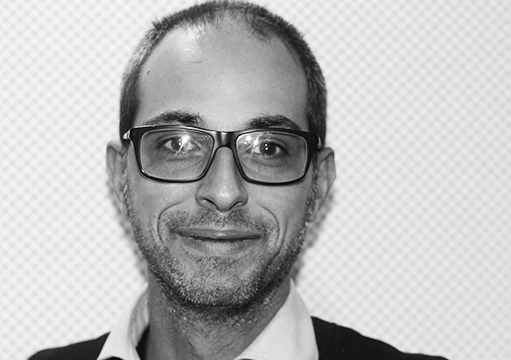
Réva is a new Barolo-focused winery project headed up by winemaker Gianluca Colombo. The winery dates to 1867 though in 2010 it was taken over by new ownership and renovated. The estate is located in the San Sebastiano region of Piedmont which is situated in a small valley between Monforte and Dogliani. The Réva winery also includes a resort featuring 12 rooms, a swimming pool and a golf course.
For a young winery Réva has gained a lot of traction in a short time. Gianluca Colombo won the Gambelli award for best young winemaker in 2015. Réva won the prestigious award Slow Wine Barolo Ravera for the 2012 vintage. Colombo and his team straddle creative innovation with adhering to classical winemaking standards. For example they are working towards "zero impact"; using solar panels and a lake for their electricity and water source. While at the same time they have cultivated over 140 different herbs which are growing wild in the vineyard.
Grape Collective talks to award-winning winemaker Gianluca Colombo about starting a wine brand from scratch in an area steeped with tradition, the changes affecting Barolo, and the debate around modern and traditional winemaking in Barolo.
Christopher Barnes: Réva, it's a new Italian brand of Barolo. What were you trying to achieve? You have all these wineries that have been around for a very, very long time that have a lot of tradition. With your new winery, what was your goal?
Gianluca Colombo: Our goal? If I have to be honest, our dream is to rise to the target to make the best Barolo ever. We don't know if we are able to, but we want to rise to the best Barolo ever. Our goal is just to make the top quality possible wines in an organic way. We are certified organic. Our goal is to make the wines that speak all about grape variety, vintage and terroir. Thanks to that, we've been in the market with three single vineyards of Barolo in the future in the next five years, where you will feel the three single vineyards' terroir in the different Barolo that we are making.
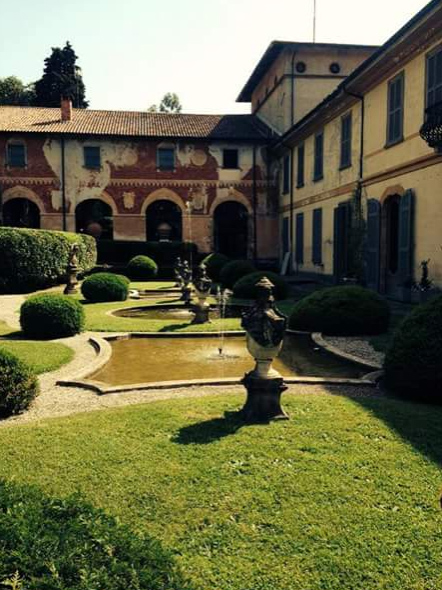
Our goal is to not be a classic producer, a traditional producer, and not to be a modern producer. We don't want to follow any flags. We want to create our flags. Thanks to my experience as a consultant winemaker that I did for 10 years, maybe 13 years, I ended up in a position where I learned a lot from a lot of producers. I was able to take the best of that and that has enabled me to learn more. Now, I make my idea of Barolo. I have my idea of how I'm making Barolo. How to work in the vineyards with the Barolo. Our way of thinking is to produce Barolo in a classical way.
It means that the wine must speak about the flavors of the grape variety, and never of the aging that you do. Each vintage will find the Barolo different. We are not making standardized wine, because each vintage is different, we just take the fruits of the vintage and respect them as much as we can. No recipe for winemaking, we have to follow what nature gives us, follow nature when winemaking and not to modify when making.
You have Barolo producers that have been around for a very long time that are making traditional wine.
Yes.
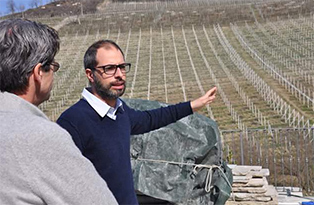
Classic.
Classic wine. How do you elevate your wines to a level which is greater than what people are doing already? You talked about wanting to make the greatest Barolo. How do you achieve that?
Maybe I will achieve that in the future. First of all in the vineyard, 95% of the quality of our wines is in the vineyard. And 5% is to not spoil what nature gave us. It's what I say every time. We just want to preserve what nature gives us. First of all, the pruning management, starting in the winter, is completely different than usual, as well as the management of the soil. We try to have as much organic substance as we can, so that we are taking care of the life underground. As much micro-bacteria is down in the soil, as much of the soil is powerful.
Management of the canopy during the vintage, management of the green harvest, management of the harvest in the right moment. Everything isn't made. We don't have any cooperative. We just work with our employees. They are trained. We are not a lot, we are just five people, but all of us are trained and we go, of course, to learn more. We have a big advantage versus other producers. When you are coming from a historical family, maybe you are the third generation, the second or the fourth, you have to follow the line of your family. The freedom that we have is a freedom that we can do what we want. There is no price for that. I am free to do the wines that I like to do without any intervention of family or my grandfather who used the oak, maybe I want to use the new barriques. I do what I want. It is a freedom. Maybe if you are a historical family then you have to follow the brand, and we don't have to.
The research on Barolo in the last 20 years brings us to produce the kind of wine that we want, but some producers can't work in that way because they have to follow a family line. We can do what we want.
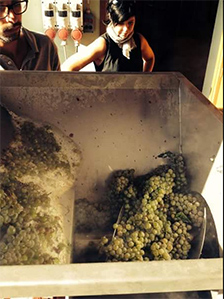
People talk about modern and traditional Barolo. What does that mean? Is there still that divide, do you think, in the Barolo community?
This is a really good question. Barolo started as a traditional wine and changed between 1980, 1990 when Robert Parker asked to change the Barolo wine. We needed the change to be so famous, and thanks to that, maybe today, now we do talk about Barolo. Otherwise, I want to be there because we were shy and nobody knows about Barolo. It was important to go there, to be now what we are, much more sure of what we have, and motivated to do it better. Everything started in 1980 when Barolo wasn't a famous wine. Barolo was just a wine that was a gift to the people who bought a lot of Dolcetto, for example. Now, you can imagine everything has changed.
I tasted a lot of modernist wine, but my questions started when I started to drink a lot of the top producer classics like Bruno Giacosa, a lot of the very famous brands like Conterno. The wines are the most expensive, the most famous, even in the period where the new face of modernist wines are good. Now, sometimes, I have the opportunity to taste the vintages of modernist and traditional producers, but there is no way. The traditional and then classic wines, usually, after 20 years, they speak better about the variety and they're much more drinkable for pleasure. I think in the last 20 years, we missed the most important things in the wine, and it's the drinkability.
A good bottle of wine is the empty one, and making the modernist wine with the overuse of barrique, overuse of oak or not good management of the maceration, we made wine so heavy, so hard to drink and wines that are a signature, but not wines that are so emotional. My target is to make emotional wine. You have to feel emotional when you drink a Barolo wine. We don't talk about the quality. The quality must be good, but at the same time, you have to feel an emotion. I think in the classic way that I want to follow is to just give emotion, making the wine the proper way when you are respecting the great variety. My target is to open my bottle after 20 years and enjoy it.
We interviewed Luca Currado a little while ago, and he thought that drinking modernist wines and traditional wines after 20 years, they came together. Do you see that or do you disagree with that statement?
Okay. Luca Currado is a very good man. He made the difference in the Langhe area. He makes awesome wines. I have a lot of respect for Luca Currado. I have to tell you my opinion. I disagree a little bit with that. I cannot tell you the brand that I tasted, but I tasted a '96 vintage of modernist, extreme modernist, maybe the most important modernist producer last week versus a '95 Bruno Giacosa white label. I can tell you it was me, and three people, all of them really, really famous winemakers. One was awarded "Best Italian Young Winemaker" and has a restaurant in our area. They brought the bottle of the modernist wine at the end of the dinner and it was more than half full, then the bottle of the classic was empty. All of us enjoyed the traditional wine more.
What it says, in my opinion, is that maybe the modernist style will decrease a little bit during the aging in the bottle. That's true, because the terroir goes a little bit over than it was before, but at the end, the classical wine is full of a line, and currency, and the drinkability that are lacking in the modernist style. In that way, in my opinion, you cannot rise.
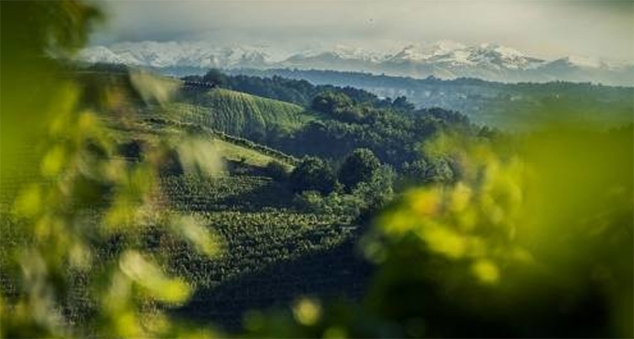
Talking about Luca Currado brings us to another point which is how the Barolo region is changing and how money is changing it. Recently, his winery was sold. There was a lot of concern that the region is going to lose its character as a lot of foreign investment comes in. Is that something that you feel?
I feel the changes happening, and I'm studying the changes. Right now, I cannot tell you the truth because maybe I don't know the truth yet. I can tell you what I'm feeling as a young winemaker in this area, that I'm living in this period and maybe will live through all the changes. Langhe, thanks to the Barolo boys as well, is always changing. Now Langhe is famous and it wasn't 30 years ago. Langhe is the closest wine area in the world to Burgundy. What is happening, we are just following what is happening in Burgundy and what's happened in Bordeaux maybe.
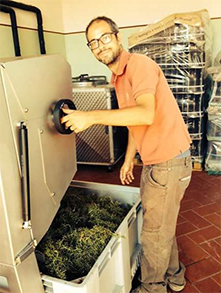
It's not about the wine can sell, because they gain a lot of money. I agree with that. Maybe because there's not a line. You don't know what is inside that company, maybe there are economic problems, maybe one day you wake up and you sit down on a mountain of gold where 20 years ago, you would sit down with nothing. It can be. You have to have a line of continuity in the company. If you don't see any continuity, maybe you have an economic problem, or you just don't see the future of the company. Well, the result of these changes is that we are closing the door on the new generation. What does this mean? It means that if a young guy who wants to make a good Barolo in this area, but has no financial resources, he will never have the possibility of buying vineyards in Barolo area, because it becomes really, really expensive and there are not enough vineyards for everybody, just for a few people.
I also think that not all the investments that come to Langhe will be successful. Just a few in my opinion, like in Bordeaux. For example, Château Palmer is not anymore the Château Palmer of 1985 or 1990. The wines are changing and the wines are not anymore like they were, and it will be the same for Langhe because you need someone from the territory who knows the territory and loves the territory to make good wines. Money is not enough to make good wines. Langhe will change, but in my opinion, will open other doors for the new generation. I don't know which kind, but we are feeling the changes.

Because I know, we talked to a lot of California winemakers, and certainly there's a feeling that if you're a young winemaker, you're priced out of Napa Valley. You can't make wine there. Is that something that is becoming an issue, from what I'm hearing, in Piedmont?
In Langhe, you cannot. If you are starting from zero, and you don't have any of your own vineyards from family from the previous generation, or maybe you are not coming from a rich, rich family, then you cannot. You cannot anymore make Barolo, you are talking about Barolo. You can maybe make Barbera, you can make Langhe Nebbiolo. The area is so small, so everybody fights for a one square meter of land. I can give you just my experience. If I go to rent maybe, not to buy a square meter of land, usually there's a fish bigger than me who will offer double, and I'm out of the game. I think that the old generation who made the Langhe like it is, is going to retire. Because I see that not in the next 20 years, but just in the next 10 years, we will see the changes. In my opinion, we will open opportunities for people who are motivated, but we will see.
How did Barolo become this global brand?
A marketing reply, because it's one of the best wines in the world. That's true. That's true. The average quality of Barolo is really high. The total production of Barolo is almost 20 million bottles. Half of the bottles, in my opinion, have quality pretty high, not all of them, but quite high. Then, just a few have a quality that is top level, but six million bottles of high quality and the average level of high quality. Then you go there and finally talk with the producer and you go into the vineyard, and it makes you taste the wine, it's something that's a decent price in my opinion.
In the United States, there's been a bit of a change in terms of how people are marketing their wines. It used to be that people were trying to please Robert Parker or please the Wine Spectator, get a big score. That seems to be less important now. It seems to be that social media is more important. It's more important in what taste makers in restaurants are buying, and drinking, and sharing. Is this something you see in Italy as well?
Yes. In Italy right now, in my opinion, 80% of the guides are not useful anymore. 20% are useful for the price. The importance of the guides in Italy is less than it was before. If you take the best that was in the guide, it doesn't mean that you sell that wine. What is important now are the opinion leaders. The opinion leaders that move the market with a blog maybe, or some papers, something that they do. The opinion leaders are the people who now manage more and they push their wineries up or down in the market, the guides are the same level. We have to think that Robert Parker and Wine Spectator are still of big importance for Italian wines, more than all the Italian guides combined.
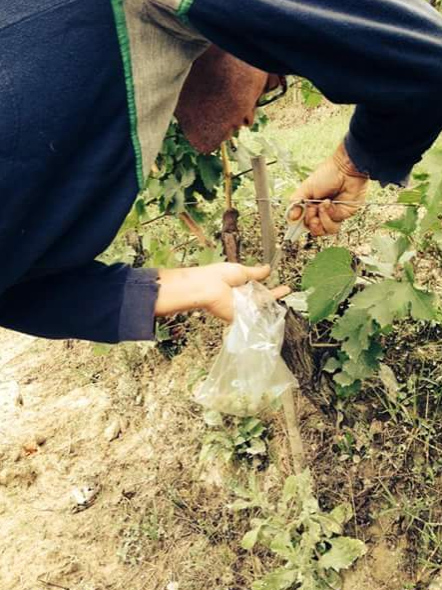
Still?
Still. Yes, or Antonio Galloni, Vinous.
For someone like you, who is the next generation coming in, is that something you pay attention to still? If they give you a 92 or a 96, are you focused on that?
I'm not focused on that, but I have to tell you that if every time I make a wine, I say, "Oh, Gianluca. You are very good winemaker. You have to not follow, but to see and to listen to others and their opinions," It doesn't mean that they care, but I need to receive the opinions of others. Some journalist, maybe more famous, maybe less famous, I still don't send the samples to Robert Parker or Antonio Galloni because they didn't taste our wines. Every time I do listen to their opinions, but it doesn't mean that their opinions will change my way of thinking.
The great thing about social media is that it's not one person's opinion, but it's a collective group of people that care about something that are sharing it. It's becoming more and more important and I think that's helping smaller producers.
Yes. It's helping smaller producers to be new because otherwise, you cannot. Because big companies have big marketing possibilities, so they can move the market in ways the small producer cannot. We are not the power of moving the market, but we are working in a different way. We are talking about 40,000 bottles per year in total production. Peanuts, nothing. Maybe we can feed New York for 20 minutes with a total production of a year. What we are talking about, almost a garage winery.
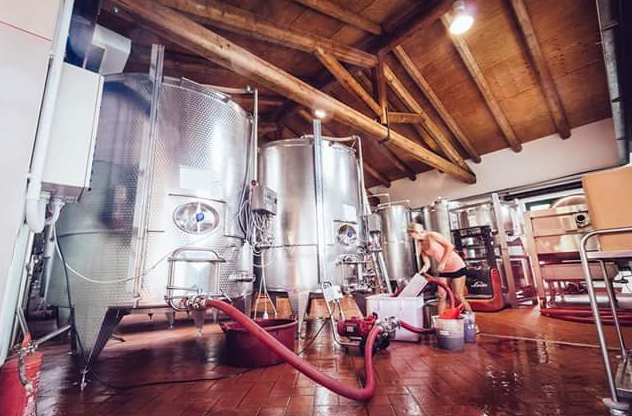
Tell me about your philosophy of winemaking.
We are organic, because to be organic is not something that makes a different value on your wines. It's like in Italy, I say, is we try and speak in English. When you go looking for a job, and they ask you, "Do you speak English?" It must be normal that you speak English. Maybe bad, but it is normal that you have to speak English. In my opinion, it's normal that you have to be organic now. More so if you open a brand new winery. In any case, we don't put on the label that we are organic, because you don't have to drink our wines because we are of biodynamic, organic or natural. You drink our wine because the wine is good. After, we tell you that we are organic. That's very important.
Why aren't there more organic producers in Piedmont?
In my opinion, because the dictated value of Barolo's eye permits you to make an investment. Be organic in this, less production per hectare, more cost for production. You cannot do that if you produce Dolcetto, because you would never gain enough money to survive. Because we thought everybody speaks about sustainability. We agree, but the first aspect to sustainability is the economical one. Otherwise, you close the company. We do the Barolo, you are allowed to do that because there's the margin that permits you to invest more in the field. Second, it's because I go in the vineyards. I would like to live now and not to die or drink something that is poison. We don't use any pesticides and we are organic certified.
Check out our interview with Barolo king Luca Currado














